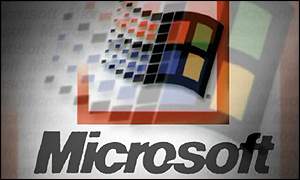| You are in: Business | ||||||||||||||||||||||||||||||||||||
|
Friday, 13 July, 2001, 21:10 GMT 22:10 UK
US seeks quick end to Microsoft case

By BBC News Online's North America Business Reporter, David Schepp
The news surrounding Microsoft has been flowing fast and furious ever since an appeals court issued a ruling in the waning days of June that dismissed splitting the software giant in two. But the court dealt Microsoft a serious blow in determining that the world's largest software firm violated antitrust laws.
On Friday, however, the US Justice Department (DOJ) asked the appeals court to expedite the Microsoft anti-trust case back to a lower court and said it will not seek a review from the Supreme Court at this stage. According to a document filed by the Justice Department on Friday at the US Court of Appeals, the 19 states who are co-plaintiffs also do not plan to seek another appeal at this time. In doing so the states and the federal government seek to speed up the process. "Delay in imposing an effective remedy inflicts substantial and widespread consumer injury and needlessly prolongs uncertainty in the computer industry," the filing said. The action follows on the heels of news earlier in the week that one state was opting out of the states' lawsuit as well as a Microsoft change in stance on software programmes installed by computer manufacturers. New Mexico bails out On Thursday, New Mexico said it was bowing out of the 19-state lawsuit against the tech giant, opting instead to have Microsoft pay the state's legal costs (in the amount of $100,000) and to share in the outcome of any eventual ruling in the case.
"If we get one or more states doing what New Mexico does, in essence you have the states passing the buck to come to the bargaining table with the government parties," Mr Litan said. New Mexico's departure leaves critics wondering if Microsoft isn't operating a stealth campaign of dividing the states and cutting deals to avoid a high-profile court case. Those close to company say it is seeking further settlements, and has hired lobbyists and upped contributions to state political parties. Despite Microsoft's efforts, members of the remaining 18 states don't expect further defections. United states So far, two states' attorneys general have stepped forward to say the coalition of the 18 remaining states and the District of Columbia, remains strong.
"Microsoft would like to reduce the number of hoops it has to jump through to get this settled," said David Coursey, columnist for ZDNet AnchorDesk. "Any states they don't have to deal with is a good thing," adding that he believes it would be difficult to come up with a settlement that would appeal to all the states involved as well as the federal government. Software shift On Wednesday, Microsoft stunned some critics by relenting and allowing personal-computer (PC) manufacturers more say on how the computer desktop - or display screen - appears. In doing so, the company performed a 180-degree reversal from previous mandates that required PC makers, such as Compaq, Dell and Gateway, to install Microsoft's Internet Explorer internet browser on computers alongside its ubiquitous Windows operating system. Indeed, a mere three years ago, Bill Gates, Microsoft's chairman, said its web browser and operating system were inseparable - without both neither would operate properly. Taming the giant In allowing PC manufacturers how desktops appear on their computers, Microsoft has implemented one solution that experts say will lessen the company's ability to abuse its monopoly in operating-system software. But Microsoft watchers say that Microsoft's gesture was largely an empty one, saying that the world's largest software maker isn't making much of a sacrifice. The states hope to ensure that whatever settlement or result comes from their legal initiative, it will result in fundamental change in the way the company does business. One remedy offered up includes requirements that ensure other software programmes run efficiently on Microsoft's Windows platform. That, they say, would help rivals develop compatible programmes and spur innovation and competition. |
See also:
Internet links:
The BBC is not responsible for the content of external internet sites Top Business stories now:
Links to more Business stories are at the foot of the page.
|
||||||||||||||||||||||||||||||||||
Links to more Business stories
|
|
|
^^ Back to top News Front Page | World | UK | UK Politics | Business | Sci/Tech | Health | Education | Entertainment | Talking Point | In Depth | AudioVideo ---------------------------------------------------------------------------------- To BBC Sport>> | To BBC Weather>> ---------------------------------------------------------------------------------- © MMIII | News Sources | Privacy |
|